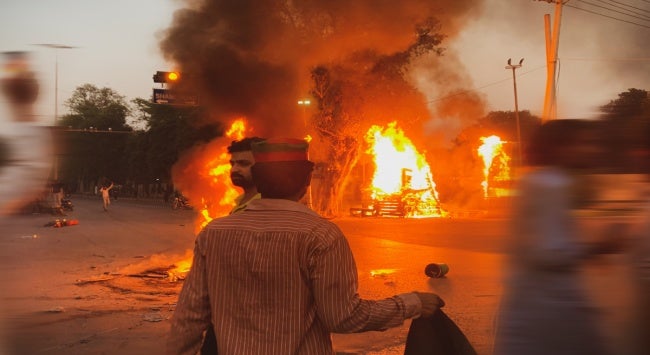Sentencing of PTI Leaders:
Pakistan’s Political Crisis Deepens
Imran Ahmed, Muhammad Saad Ul Haque
18 August 2025Summary
The sentencing of senior Pakistan Tehreek-i-Insaf (PTI) leaders by anti-terrorism courts in July 2025 for their alleged role in the May 2023 protests has intensified political turmoil and further strained relations between the opposition and the government. The means and methods deployed to silence dissent and cripple the PTI use the cover of law. In the short run, this consolidates the government’s grip on power. However, in the long run, it comes at the cost of deepening political polarisation and further eroding trust in the political process and in state institutions.
On 23 July 2025, an anti-terrorism court (ATC) sentenced eight leaders of former Prime Minister Imran Khan’s party, the Pakistan Tehreek-i-Insaaf (PTI). The leaders were convicted for their role in the May 2023 protests, which came in the aftermath of Khan’s arrest. This sentencing comes weeks after the PTI lost the verdict in the reserved seats case, resulting in the loss of more than 80 seats from the national parliament, which will now be redistributed amongst the coalition members.
Four senior leaders were sentenced, including former provincial health minister Dr Yasmin Rashid, Senator Ejaz Chaudhry, former governor Omar Sarfraz Cheema and former provincial minister Mian Mehmoodur Rashid. All were handed down 10 year sentences, with ATC Judge Arshad Javed announcing the decision in Kot Lakhpat Jail in Lahore.
The original charge sheet was submitted in September 2023, after which 14 accused were indicted. Amongst the accused was PTI Vice Chairman Shah Mehmood Quereshi, who the courts acquitted alongside five others. The 14 members were accused of planning the 9 May 2023 protests at Zaman Park on 7 May 2023. At the final hearing before the judgement, Deputy Prosecutor General Abdul Jabbar Dogar contended that party leaders had intended to incite party workers to commit violence against state property.
The PTI claimed that the decision was purely political and intended to disrupt the party’s planned rally on 5 August 2025 to mark the anniversary of Khan’s arrest. The party asserted that the verdict was a major blow to judicial integrity and challenged the credibility of the witness testimony presented during the trials. Furthermore, questions were posed surrounding the impartiality of the judicial process.
Days later, on 31 July 2025, an ATC in Faislabad announced further sentences for 108 PTI members. Amongst the convicted were opposition leader Omar Ayub Khan and Sahibzada Hamid Raza. Khan’s media advisor Zulfi Bukhari lamented the decisions, stating, “Convicting opposition leaders one after another is not a good omen for any democratic system, and it will seriously damage our already fragile democracy”. Out of 185 people implicated for their role in the May 2025 protests, 108 were sentenced, while 77 were acquitted.
Minister of State for Interior Talal Chaudhry dismissed the PTI’s pleas and asserted that the court’s decisions were supported by “clear evidence and facts”. He rejected the PTI’s allegations against the credibility of the evidence presented during the trials and reiterated that “[t]he planning for these acts took place at the homes of PTI leaders.”
Meanwhile, PTI defence lawyer Burhan Moazzam confirmed that the party would appeal the decision. He questioned the judgments, stating, “It is surprising that six people were acquitted while eight were convicted, even though they were all charged under the same allegations”, referring to the Lahore ATC’s sentences. Meanwhile, PTI Chairman Barrister Gohar Ali Khan proclaimed that the “political cases against [the] PTI members were baseless” and that the PTI would challenge all the decisions in higher courts.
These developments come at a time when Pakistan’s judicial integrity and independence have repeatedly been called into question. In October 2024, Pakistan passed the 26th Amendment Act, which the PTI say has politicised the judicial selection process in the country. The Act gives the government a decisive role in choosing the chief justice.
The PTI’s pledge to appeal the decisions suggests that these legal battles will remain at the forefront of national politics for the time to come. Sustained pressure from law enforcement, diminishing parliamentary representation and the erosion of its leadership and organisational networks have increasingly backed the party into a corner. Its battle to free Khan is now intertwined with a broader fight over political survival. Over the past year, its access to Khan has been restricted, and internal divisions have deepened. There are also other concerns for the party. The government had banned all assemblies and gatherings for a week in the lead-up to the party’s planned 5 August 2025 protests.
Finally, as the squeeze on the PTI tightens, the means and methods deployed by the government and the establishment to silence dissent and cripple the opposition use the cover of law. In the short run, this consolidates the government’s grip on power. However, in the long run, it comes at the cost of deepening political polarisation and furthering the erosion of trust in the political process and in state institutions. The resulting fallout is not only resentment and frustration, but ultimately violence and unrest.
. . . . .
Dr Imran Ahmed is a Research Fellow at the Institute of South Asian Studies (ISAS), an autonomous research institute at the National University of Singapore (NUS). He can be contacted at iahmed@nus.edu.sg. Mr Muhammad Saad Ul Haque is a Research Analyst in the same institute. msaaduh@nus.edu.sg. The authors bear full responsibility for the facts cited and opinions expressed in this paper.
Pic Image: ISAS
-
 More From :
More From :
-
 Tags :
Tags :
-
 Download PDF
Download PDF



